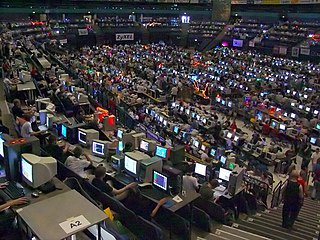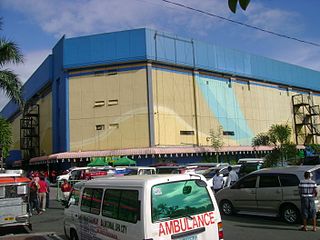
Hamar is a town in Hamar Municipality in Innlandet county, Norway. Hamar is the administrative centre of Hamar Municipality. It is located in the traditional region of Hedmarken. The town is located on the shores of Mjøsa, Norway's largest lake. Historically, it was the principal city of the former Hedmark county, now part of the larger Innlandet county.

The demoscene is an international computer art subculture focused on producing demos: self-contained, sometimes extremely small, computer programs that produce audiovisual presentations. The purpose of a demo is to show off programming, visual art, and musical skills. Demos and other demoscene productions are shared at festivals known as demoparties, voted on by those who attend and released online.

The Assembly demoparty is a demoscene and gaming event in Finland. It is the biggest demoscene party. The main organizers of the event are Pekka Aakko and Jussi Laakkonen. The Summer event takes place every year between late July and early August, and lasts three to four days, and the Winter event is held in January or February. Edition 2020 was online. The most recent Assembly was held from 3 to 6 of August 2023 at Messukeskus in Helsinki.

Arena Birmingham is an indoor arena and sporting venue in central Birmingham, United Kingdom. It is owned by parent company the NEC Group. When it was opened in 1991, it was the largest indoor arena in the UK.
A LAN party is a social gathering of participants with personal computers or compatible game consoles, where a local area network (LAN) connection is established between the devices using a router or switch, primarily for the purpose of playing multiplayer video games together. LAN party events differ significantly from LAN gaming centers and Internet cafes in that LAN parties generally require participants to bring your own computer (BYOC) and are not permanent installations, often taking place in general-use venues or residences.
DreamHack is an ESL Gaming brand specializing in esports tournaments and other gaming conventions. It is recognized by the Guinness Book of Records and Twin Galaxies as being the world's largest LAN party and computer festival with the world's fastest Internet connection and the most generated traffic. It usually holds its events in Western Europe and North America.

Sheffield Arena, known for sponsorship purposes as Utilita Arena Sheffield, is a multi-purpose arena located in Sheffield, England. It is situated near Meadowhall and lies between Sheffield city centre and Rotherham town centre.

The Coliseo de Puerto Rico José Miguel Agrelot is the biggest indoor arena in Puerto Rico dedicated to entertainment. It is located at the Golden Mile of San Juan, the island capital. It is usually referred by Puerto Ricans as the Choliseo or Choli, which is a portmanteau of the words "Coliseo" and "Cholito", in reference to Don Cholito, one of José Miguel Agrelot's characters and Agrelot's own adopted nickname. It has consistently been ranked among the highest ticket-selling venues globally.

First held in 1823, the Sydney Royal Easter Show, commonly shortened to The Easter Show or The Show, is an annual show held in Sydney, Australia over two weeks around the Easter period. It comprises an agricultural show, an amusement park and a fair and combines the elements of each, showcasing the judging of livestock and produce. The Royal Agricultural Society of New South Wales is responsible for the event. Queen Victoria awarded the society and its show the right to use the word "Royal" in its name.

Ticket resale is the act of reselling tickets for admission to events. Tickets are bought from licensed sellers and then sold for a price determined by the individual or company in possession of the tickets. Tickets sold through secondary sources may be sold for less or more than their face value depending on demand, which tends to vary as the event date approaches. When the supply of tickets for a given event available through authorized ticket sellers is depleted, the event is considered "sold out", generally increasing the market value for any tickets on offer through secondary sellers. Ticket resale is common in both sporting and musical events.
Godskitchen is an international superclub brand which is associated with dance music and organises events, particularly in the UK and US. The company used to run a club night of the same name at their nightclub AIR, in Birmingham. Godskitchen has an in-house music label. This label annually releases compilation albums, in addition to supporting new artists whom they believe bring something new to the genre.

Vikingskipet, officially known as Hamar Olympic Hall, is an indoor multi-use sport and event venue in Hamar, Norway. It was built as the speed skating rink for the 1994 Winter Olympics, and has since also hosted events and tournaments in ice speedway, motorcycle speedway, rally, association football, bandy, ice sledge speed racing, flying disc and track cycling. The arena is also used for concerts, trade fair and the annual computer party The Gathering. It is the home arena of Hamar IL bandy team. The venue is owned by Hamar Municipality, and along with Hamar Olympic Amphitheatre is run by the municipal Hamar Olympiske Anlegg. Vikingskipet has a capacity for 10,600 spectators during sporting events and 20,000 during concerts.

The Cuneta Astrodome is an indoor arena that is located in Pasay, Philippines. The arena has hosted Philippine Basketball Association games from 1993 to 1999 and again from 2001 onwards, and also currently serves as the home arena of the Pasay Voyagers of the Maharlika Pilipinas Basketball League. It also became the permanent home of the now-defunct Philippine Super Liga since 2014. It has also hosted a slew of other political, evangelical gatherings and church anniversaries.

The BOK Center, or Bank of Oklahoma Center, is a 19,199-seat multi-purpose arena and a primary indoor sports and event venue in Tulsa, Oklahoma, United States. Designed to accommodate arena football, hockey, basketball, concerts, and similar events, the facility was built at a cost of $178 million in public funds and $18 million in privately funded upgrades. Ground was broken on August 31, 2005, and a ribbon-cutting ceremony took place on August 30, 2008.

Briskeby Stadion, previously known as Briskeby gressbane, is an all-seater football stadium located at Briskebyen in Hamar, Norway. It is home to the Norwegian First Division side Hamarkameratene (Ham-Kam) and is owned by Hamar Municipality. The venue has artificial turf, three stands and a capacity for 8,068 spectators. It was used for the 1938 Norwegian Football Cup Final—which saw the venue's record 14,500 spectators—and has also hosted five Norway national under-21 football team matches between 1984 and 2011.

CC Amfi, also known as Nordlyshallen, is an indoor sports arena in Hamar, Norway. It is mostly used for ice hockey and is the home arena of Storhamar Hockey. It has also been used for short track speed skating, figure skating, handball, events and concerts. The venue has a capacity for 7,000 spectators and was built for the 1994 Winter Olympics, where it was used for short track speed skating and figure skating. Other major events held at the arena include the 1999 IIHF World Championship in ice hockey, the 1999 World Women's Handball Championship, the 2012 IPC Ice Sledge Hockey World Championships and the 2016 Winter Youth Olympics.

Telenor Arena, sometimes referred to as Fornebu Arena, is a multi-purpose indoor arena located at Fornebu in Bærum, outside Oslo, Norway. It serves as a venue for a variety of events, including concerts, exhibitions, action shows, family shows, TV and sport. It has a capacity for 15,000 spectators for sports and 25,000 for concerts, including 40 luxury boxes and club seating for 1,200. The venue has a fixed roof and an asphalt floor. The venue was opened ahead of the 2009 Norwegian football season as a replacement for Nadderud Stadion. It cost 585 million Norwegian kroner (NOK) to build, of which NOK 300 million was for the sports venue. The arena will host the 2025 World Men's Handball Championship with the country, Croatia and Denmark including the final.

The OVO Hydro is a multi-purpose indoor arena located within the Scottish Event Campus in Glasgow, Scotland.

The 3Arena (originally The O2) is an indoor amphitheatre located at North Wall Quay in the Dublin Docklands in Dublin, Ireland. The venue opened as The O2 on 16 December 2008 and was re-branded on 4 September 2014 due to the takeover of O2 Ireland by Three Ireland. The venue is owned by a Live Nation subsidiary, Apollo Leisure Group Ltd. and is among the top ten busiest music arenas by ticket sales in the world.

Boomtown is a British music festival held annually on the Matterley Estate in South Downs National Park, near Winchester, Hampshire. It was first held in 2009 and has been held at its current site since 2011. Its diverse line-up of bands, DJs and speakers perform on many different stages each a part of a district with its own individual theme. Each yearly event is known as a Chapter and expands on the story line from the previous year, told through the sets, live actors and many forms of alternate reality games. The festival site is split into several districts, and the narrative is reflected in the design of the districts, streets and venues, which are populated by hundreds of actors to play the role of inhabitants. The large scale of the sets and infrastructure require six weeks of construction, and a month of disassembly.


















